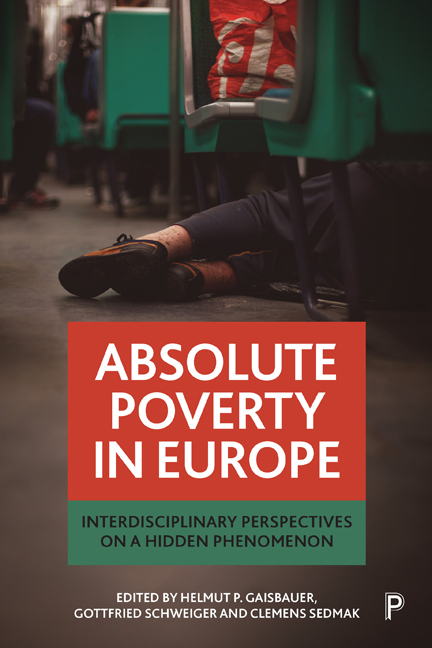Book contents
- Frontmatter
- Contents
- List of figures and tables
- Notes on contributors
- 1 Absolute poverty in Europe: introduction
- Part One Conceptual and methodological challenges
- Part Two Key issues for the absolute poor
- Part Three Policy responses to absolute poverty in Europe
- Part Four Ethical perspectives on absolute poverty in Europe
- Conclusion responding to the dark reality of absolute poverty in European welfare states
- Index
13 - Faith-based organisations as actors in the charity economy: a case study of food assistance in Finland
Published online by Cambridge University Press: 27 April 2022
- Frontmatter
- Contents
- List of figures and tables
- Notes on contributors
- 1 Absolute poverty in Europe: introduction
- Part One Conceptual and methodological challenges
- Part Two Key issues for the absolute poor
- Part Three Policy responses to absolute poverty in Europe
- Part Four Ethical perspectives on absolute poverty in Europe
- Conclusion responding to the dark reality of absolute poverty in European welfare states
- Index
Summary
Introduction
In recent decades, charitable food assistance has grown into a prevalent way to respond to hunger as a manifestation of severe or absolute poverty that persists even in the affluent European welfare states. By severe poverty we refer to an economic condition of life which leaves an individual or family not only physically hungry but also in a situation where the basic need for nutritious, healthy food is unmet to such a degree that it seriously violates the chance of sustaining socially accepted membership of society. Throughout Europe, nongovernmental organisations (NGOs), and faith-based actors in particular, have taken up the task of alleviating the immediate food needs of the most deprived people by delivering foodstuffs that originate to a great extent from food markets as surplus donated by food corporations and retailers. As an affluent Nordic welfare state with more than two decades of history in this modern food charity, Finland provides an illustrative context to explore faith-based organisations as actors in the charity economy which is an alternative distribution system where unwanted consumer goods are redistributed from those who have a surplus to those who are in need.
In Finland, the first food banks and bread lines were founded in the early 1990s in order to respond to the immediate needs faced by increasing numbers of people in the aftermath of the deep economic recession of that time. The initial perception was that food charity was only a temporary emergency response that was supposed to come to an end after the economy recovered. However, from then on food charity has proliferated and become a rather permanent, even if so far only loosely publicly coordinated, feature of last resort material aid for people afflicted by severe poverty.
In Finland, recipients of food assistance typically do not need to prove their need of aid through any administrative documents, that is to say there is no means testing. Hence, neither accurate official statistics nor a reliable time series of the numbers of people receiving food assistance, nor the depth of the poverty these people are afflicted by are available. Nevertheless, the Evangelical Lutheran Church of Finland (ELCF) has produced some figures relating to its own food delivery. In addition, there is an extensive survey collected by the hard-to-survey-populations strategy during 2012–2013 (Ohisalo, 2017: 51).
- Type
- Chapter
- Information
- Absolute Poverty in EuropeInterdisciplinary Perspectives on a Hidden Phenomenon, pp. 267 - 288Publisher: Bristol University PressPrint publication year: 2019



